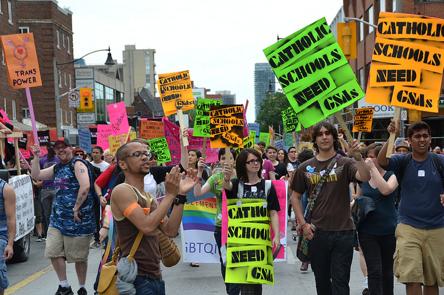
Ontario Catholic students marching for GSAs at Stonewall TO in 2011. Credit: Andrea Houston
Results from a groundbreaking American study on gay-straight alliances (GSAs) have confirmed what Canadian students fighting for GSAs have been saying all along: clubs that provide support for queer youth help prevent depression, victimization, substance abuse and suicide.
A school with a GSA has a lower drop-out rate and produces students who are more likely to attend college or university. GSAs also help educate students and community members by spreading a message of love, acceptance and equality.
These are just some of the findings in High School Gay-Straight Alliances (GSAs) and Young Adult Well-Being: An Examination of GSA Presence, Participation, and Perceived Effectiveness, a new study by Caitlin Ryan, a San Francisco State University faculty member and director of the Family Acceptance Project, a research group that provides support for families with lesbian, gay, bisexual and transgender children. Ryan is a clinical social worker who has worked on queer health and mental health since the 1970s.
Over the course of about six months in 2005, Ryan asked 245 young queer adults between the ages of 21 and 25 about their high school GSAs. The study highlights the lasting effects of school victimization on queer students, and it found that many serious issues last into adulthood.
“In schools with high levels of LGBT school victimization, those young people are five and a half times more likely to have attempted suicide at least once, two and a half times more likely to be diagnosed with a sexually transmitted disease and twice as likely to be at high risk for HIV through unprotected sexual behaviour,” she says.
According to Statistics Canada, 458 young Canadians between the ages of 10 and 24 committed suicide in 2008. Egale says suicide is the second leading cause of death among Canadian youth, and studies have found suicide rates among gay youth are four times higher than their non-queer peers, the CBC reports.
Ryan acknowledges that many of her findings will appear obvious to students and GSA advocates — that victimizing young people will have lasting effects on their health — but up until now, no data existed to prove that, she says.
“This study shows that in schools with GSAs, young people are much more likely to report lower levels of depression and are less likely to drop out of school. They are also more likely to attend college,” she adds. “In fact, students that reported to have a GSA say the school clubs provide education and support for the wider school community about LGBT issues. So the positive effects are even greater.”
Many schools — in both the US and Canada — continue to prevent GSAs and undermine the purpose of the groups, Ryan notes. “Religious schools that perceive homosexuality as sinful and immoral are a large issue . . . In the media, kids are constantly told ‘it will get better.’ But for so many of these students, it doesn’t get better.”
Over the past year, several Ontario Catholic schools have banned students from creating GSAs.
The Assembly of Catholic Bishops and the Ontario Catholic School Trustees’ Association (OCSTA) have been promising to release guidelines to instruct Catholic schools on how to support queer students (the document is now almost four months late). For now, students are allowed only general “anti-bullying” groups. The groups must not contain the words “gay” or “rainbows.”
Ryan says her research shows this is the wrong approach. “Now we have research that shows GSAs provide benefits to students that last into adulthood.”
Schools with GSAs have a safer school climate overall, there’s less harassment, and teachers are more likely to intervene if they spot bullying, she says. “Having a GSA in schools is associated with lower levels of attempted suicide. And students who are members of a GSA actually have higher grades.”
Ryan says it is irresponsible for schools to prevent GSAs, to allow queer youth to endure years of torment, then send them out into the world and expect them to undo the mental damage, especially when it’s preventable.
“It’s the role of schools to socialize and prepare students to participate in society, make lasting contributions and to have careers,” she says. “We have a responsibility, when we know what works, to create safe environments for all students.”

 Why you can trust Xtra
Why you can trust Xtra


